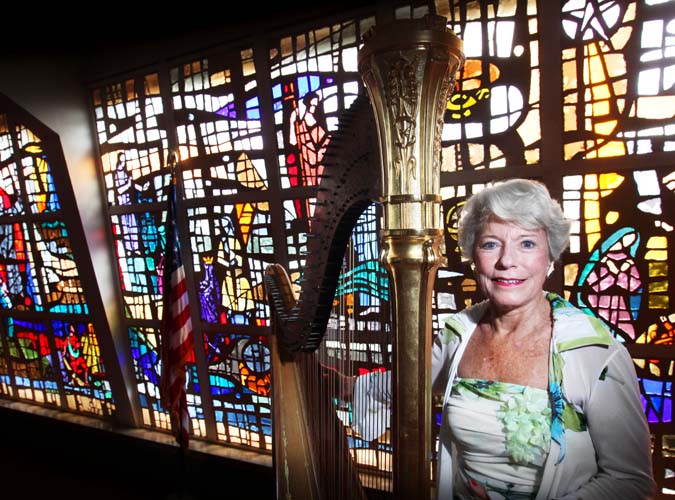VERO BEACH — There is something angelic about harpist Sharon Watson, dressed in white chiffon, as she draws her manicured fingers across the strings of her gilded harp. Like an angel, she is persevering through a devil of a hard time lately, after becoming the victim of a white collar crime that turned her retirement years into one of the most driven points of her career.
“I need to be extremely busy,” she says. “I don’t care if I’m playing for two people or a roomful. I have to play.”
Watson is anxious to make the most of her triple-threat talents: harpist, pianist and organist.
From Chicago to Palm Beach, her career has taken her from grand hotels to jazz clubs, from church choir lofts to theater pits.
For a decade, she was a fixture at the Breakers in Palm Beach. She played the Boca Hotel and Club and the Everglades Club in Palm Beach, and the Ritz Carlton in Puerto Rico.
She has played with orchestras from opera to pops, including with Doc Severinsen and jazz great Dave Brubeck, when he played at Riverside Theatre in the 1990s.
She earned two master’s degrees in piano and organ from the American Conservatory of Music, then based in Chicago. She earned another degree in harp from Valparaiso University and when she moved to Florida, was beginning doctoral studies at Florida State University until family circumstances drove her north again.
Watson teaches, composes and arranges.
Her harp music is still used at music schools including Eastman and Indiana. She even wrote a mass in the style of a bossa nova and performed it in an Episcopal church.
“They’re a lenient bunch,” she says.
Three years ago, while visiting her son David Watson in Vero, she played with Marcos Flores, music minister of Christ by the Sea Methodist Church.
When she moved back to Vero three months ago, she contacted Flores, who told her about the Vero Beach Theatre Guild needing an accompanist for its staging of “Disney’s Beauty and the Beast” in March.
Those rehearsals have already begun.
It isn’t the first time that having to put one foot in front of the other in a difficult time has caused her to relocate.
An unexpected divorce sent her seeking out sunnier days in Florida years ago. More recently the death of her mother sent her home to Indiana to help her aging dad.
This time, when she was the victim of embezzlement (the perpetrator served two years in prison, she says) she sought solace in her children.
For the past year, she lived with her daughter, Rosemary Watson, a voiceover artist, actress and comedian.
Last fall, finding southern California too stressful, Sharon Watson moved to Vero where her son David lives, moving into a Central Beach house she bought as an investment years ago.
In the sanctuary of the First Presbyterian Church here, warmed by the light through myriad stained glass windows, Watson has played for services.
After practicing one morning last week, she draws her hands toward her, reining in the cavalcade of notes that want to resonate a moment more.
Any ethereal impression ends, however, when she stops playing, stands, tilts the 80-pound instrument onto its caster and hauls it across the room. With help, she loads it on a dolly and maneuvers it into her wood-paneled station wagon, a 1995 Buick with 200,000 miles on it.
“Official Harp Transport Vehicle,” reads the bumper sticker beside her California plate. Already the transport vehicle is being put to good use at the Moorings Club, where she played last week, and the Vero Beach Country Club.
Watson grew up on a farm in Kokomo, Ind. Her mother was a music teacher who taught her to play piano.
At 13, she realized she had perfect pitch at a church camp when “someone forgot the pitch pipe.”
She put that skill to good use in high school accompanying a barber shop quartet and arranging the group’s music.
One day, her mother took her to a harp concert, given by red-haired harpist with the glamour of a starlet, who captivated Sharon.
Years later, when she enrolled at Indiana University to study piano, the same harpist was spending a year there studying.
Enthralled, Watson took up the instrument.
“It’s the sound of it,” she says. “Some people like bagpipes. I just happen to see the beauty in harp music.”
For much of her life, she made annual pilgrimages to Puerto Rico to study with the renowned teacher, Maria Rosa Vidal.
“I studied 22 years with her, and it took her 14 years before she said, ‘That’s good,’” says Watson.
The memory still elicits a sigh of frustration.
“I was in tears. I thought I’ll never learn this instrument. She would just touch it and the tone was there, and I thought, how can I do that?” she recalls.
Many years later, with mastery finally hers, she can describe what it takes to play.
“Your body is feeling this thought that you want to come through on the strings. It just comes out of your fingers,” she says.
“Your touch is so much part of you. You just don’t bang around on a harp. You can bang on a piano but you just don’t do that on a harp. It’s a gentle loving touch.”

